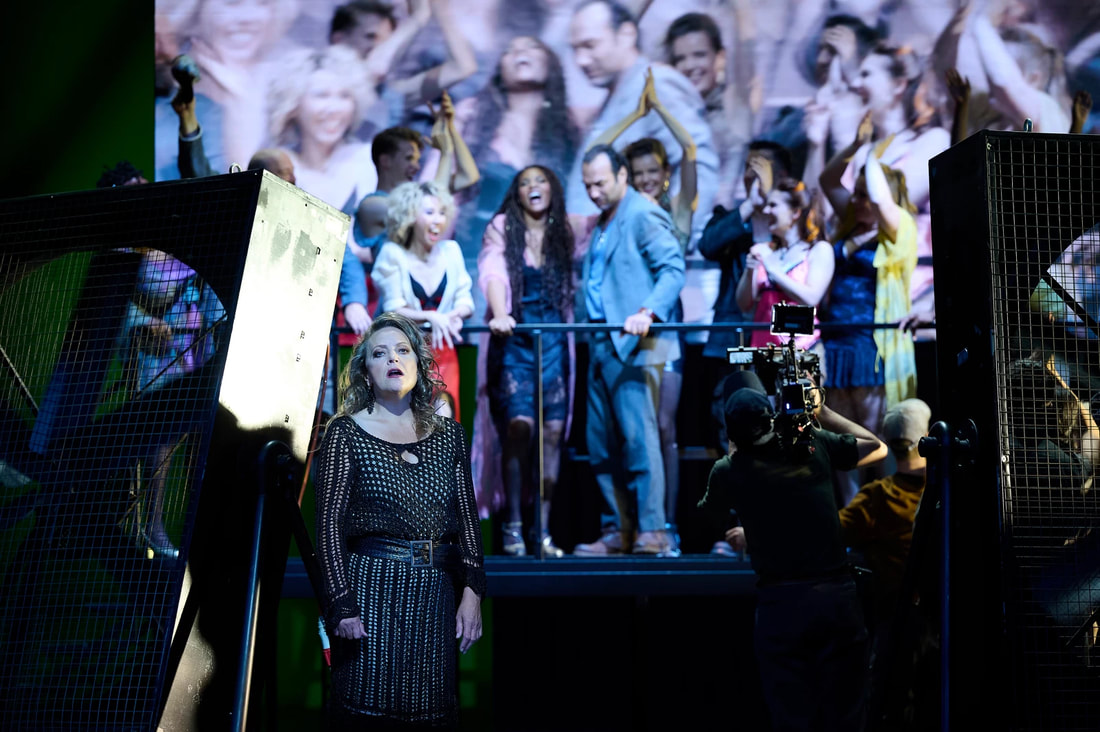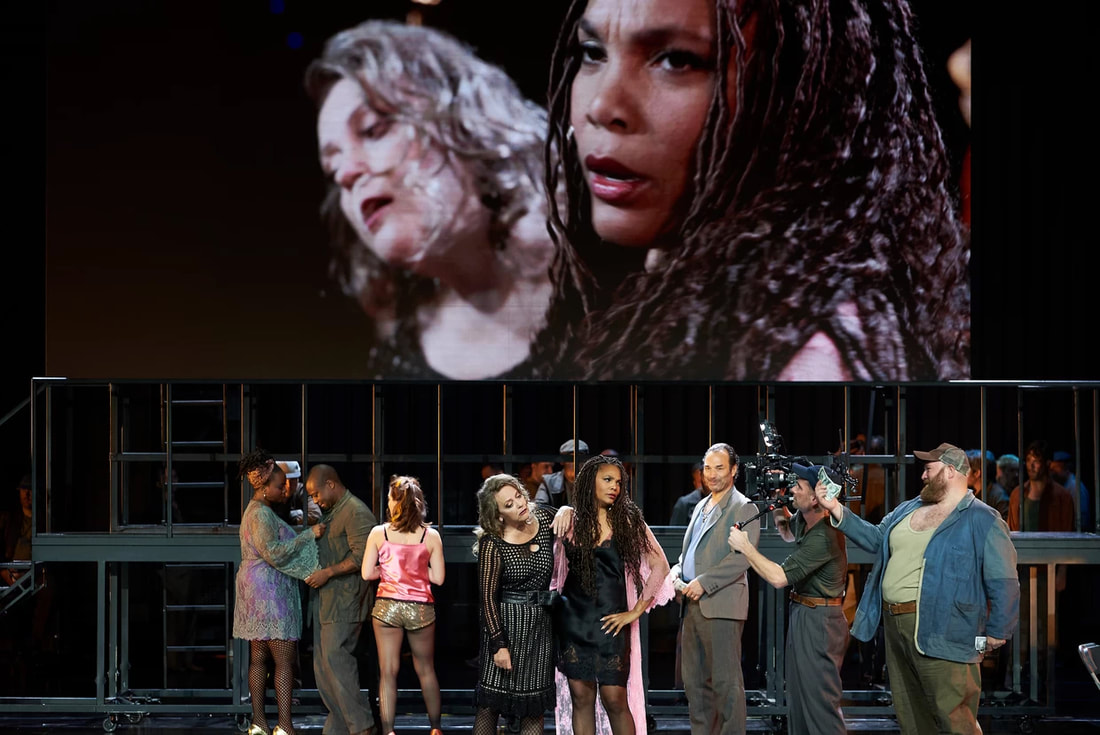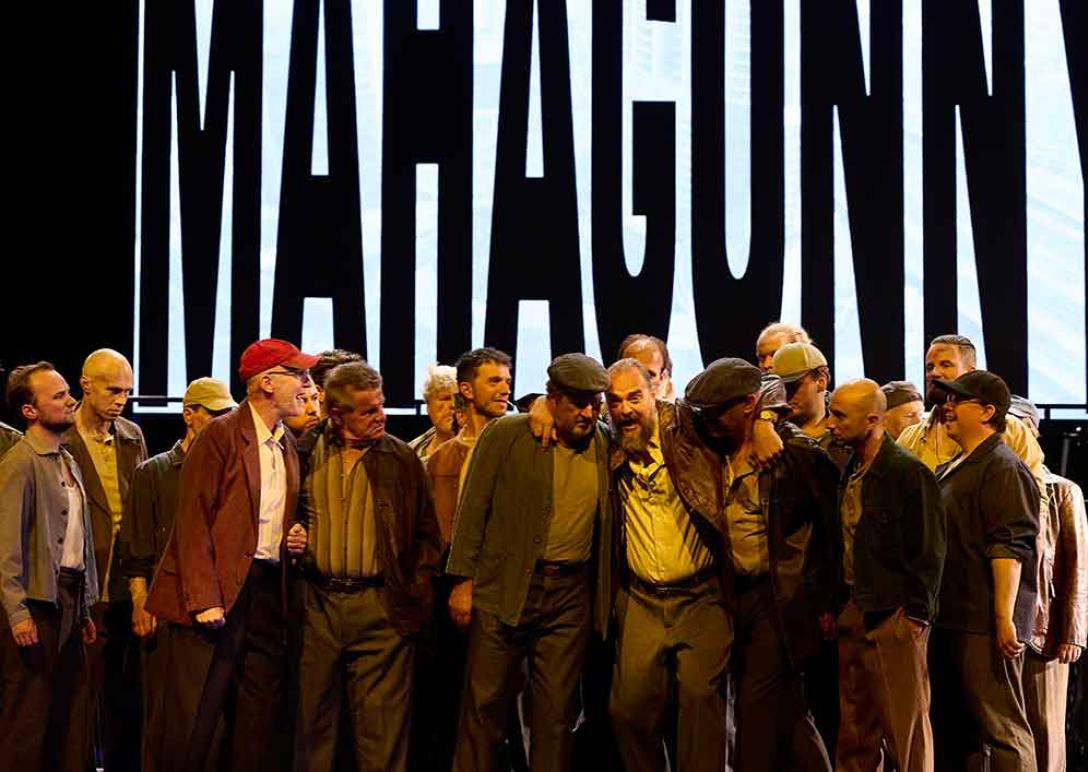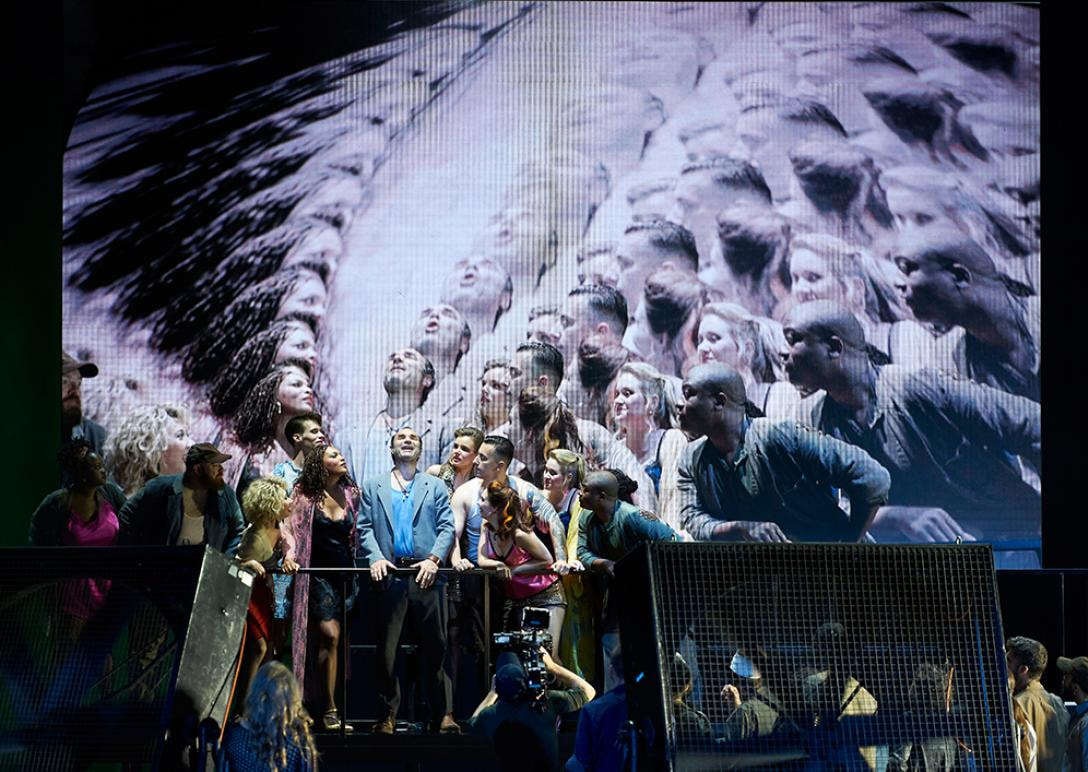After his 2017 production of Salome, Ivo van Hove returns to The Dutch National Opera with Kurt Weill's "Aufstieg und Fall der Stadt Mahagonny. After his successful Salome (2017), Ivo van Hove returns to The Dutch National Opera with Aufstieg und Fall der Stadt Mahagonny. That return was postponed for three years because the originally planned performances of this production were cancelled in 2020 due to the Covid lockdown. Last year this production was seen at Opera Vlaanderen. Now The Dutch National Opera is opening the new 2023/2024 season with it. In the barren sands of Aufstieg und Fall der Stadt Mahagonny, Kurt Weill and Bertolt Brecht piece together a dystopian story in which man feasts on excess and gives in to primal urges. We see a stage with a large video screen. That's where it all happens. There we see how the city of Mahagonny is founded, becomes a place for all sorts of excesses and finally goes up in flames. Unlike previous opera productions by Van Hove, where the use of video images was often superfluous and gratuitous (Schreker's Der Schatzgräber for DNO!), the use of camera images, video projections and green screens in this production finds a justification within a set-up in which the stage becomes a place in which reality and illusion complement and challenge each other. A reality in which anything goes. A reality that is stripped of its illusions when not having money turns out to be punishable by death. The excesses of Mahagonny find a frenzied imagination in the excessive use of video. On a green screen, ultimum of the illusion in which man loses himself, someone is beaten to death in a boxing match, a line of men can be seen taking a prostitute from behind. These are images that leave little to the imagination, that alternately impress, depress and flatline. Images that, through their lavish use, emphasize the emptiness behind them but also make you wonder if the visual excess does not harm at some point. That the head, deliberately placed above the heart by Brecht, is not pushed away too much by the visual splendor that ultimately has a hypnotic and narcotic effect. The use of video on stage can now no longer be called new, although Van Hove still seems to be searching for the limits of its possibilities; the presence of a cameraman on stage is a fairly recent phenomenon. Social media have found its way to the theatrical stage and, since the Covid period, have hardly been absent. In the last five operas I saw, there was a cameraman walking around on stage whose recordings were projected onto a video screen. Reality recorded by cameras as an indispensable component of experienced reality. Mahagonny here gets an opera cast with an impressive track record. Evelyn Herlitzius, well-versed in Wagner and Strauss and Nikolai Schukoff (he previously sang the title role of Lohengrin at DNO) are, respectively, the con artist Leokadja Begbick and Jim Mahoney, the man who finds out that an empty wallet literally means the end. Herlitzius has never lacked expression; in addition to her singing, she has always had to depend to a not inconsiderable degree on her acting. In a role where acting is more important than the beauty of a voice, she is perfectly in place (I couldn't escape thinking of Elektra at her occasional outbursts). Nikolai Schukoff, together with Lauren Michelle's Jenny, forms a radiant centerpiece of a love that is, very opera-tesque, doomed. Lauren Michelle sings a beautiful role with which she poignantly colors her desires but at times its deeply human impact, along with the rest of the production, seems to fade into the digital oasis that is Mahagonny. That a production of a play that addresses the emptiness of excess sometimes gets itself caught up in the drive for technological splendor is not without irony. The story revolving around the seduction and perversion of ideals through greed for money finds a compelling performance with an excellent cast and fine orchestra. The Netherlands Philharmonic Orchestra, conducted by Markus Stenz, a specialist in 20th-century repertoire, adeptly discharges its duty to bring Weill's musical world with elements of ragtime, jazz and tango to life with rhythmic alertness. Orchestra and singers, in connection with the dystopian story they tell, form a harmonious whole. The Chorus of Dutch National Opera effortlessly switches between a cappella and a quasi-Slave Chorus. They contribute, in no small way, in bringing Weill's musical world alive. In Mahagonny's predecessor Dreigroschenoper, it was said that the common man cannot care about morality until he has food (Erst kommt das Fressen, dann kommt die Moral). In Aufstieg und Fall der Stadt Mahagonny, that adage is expanded into the motto of a city, a place where anything goes, provided it is paid for. "Erstens, vergeßt nicht, kommt das Fressen Zweitens kommt der Liebesakt. Drittens das Boxen nicht vergessen Viertens Saufen, laut Kontrakt. Vor allem aber achtet scharf Daß man hier alles dürfen darf.” The politically-satirical comments on capitalism continue to resonate especially today. With songs that have made it into pop music, the Alabama Song (The Doors) Aufstieg und Fall der Stadt Mahagonny along with its bristling and haunting music can be considered a unique amalgam of extremes. A musical theater that, in this production, is not so much a paragon of Brechtian alienation but rather characterized by an overwhelming of the senses. A production that reminds us with its exorbitant use of resources that it is often the simple gesture that leaves the deepest impression and to which the concluding oratorio-like chorus makes it known that for real drama, even when human degeneration reaches a nadir, real beauty is indispensable. Aufstieg und Fall der Stadt Mahagonny (Kurt Weill & Bertolt Brecht), Muziektheater Amsterdam 9 September 2023 Conductor: Markus Stenz Regie: Ivo van Hove Decor & light: Jan Versweyveld Costums: An D’Huys Video: Tal Yarden Dramaturgie: Koen Tachelet Leokadja Begbick: Evelyn Herlitzius Fatty: Alan Oke Dreieinigkeitsmoses: Thomas Johannes Mayer Jenny Hill: Lauren Michelle Jim Mahoney: Nikolai Schukoff Jack O’Brien/Tobby Higgins: Iain Milne Bill: Martin Mkhize Joe: Mark Kurmanbayev* Sechs Mädchen von Mahagonny Viola Cheung, Thembinkosi Magagula, Elisa Soster, Raphaële Green, Kadi Jürgens, Jessica Stakenburg * Dutch National Opera Studio Chorus of the Dutch National Opera Netherlands Philharmonic Orchestra Coproductie with Festival d’Aix-en-Provence, Metropolitan Opera, Opera Ballet Vlaanderen & Grand Théâtre de Luxembourg - Wouter de Moor
0 Comments
Leave a Reply. |
TIMELINE
July 2024
|





 RSS Feed
RSS Feed